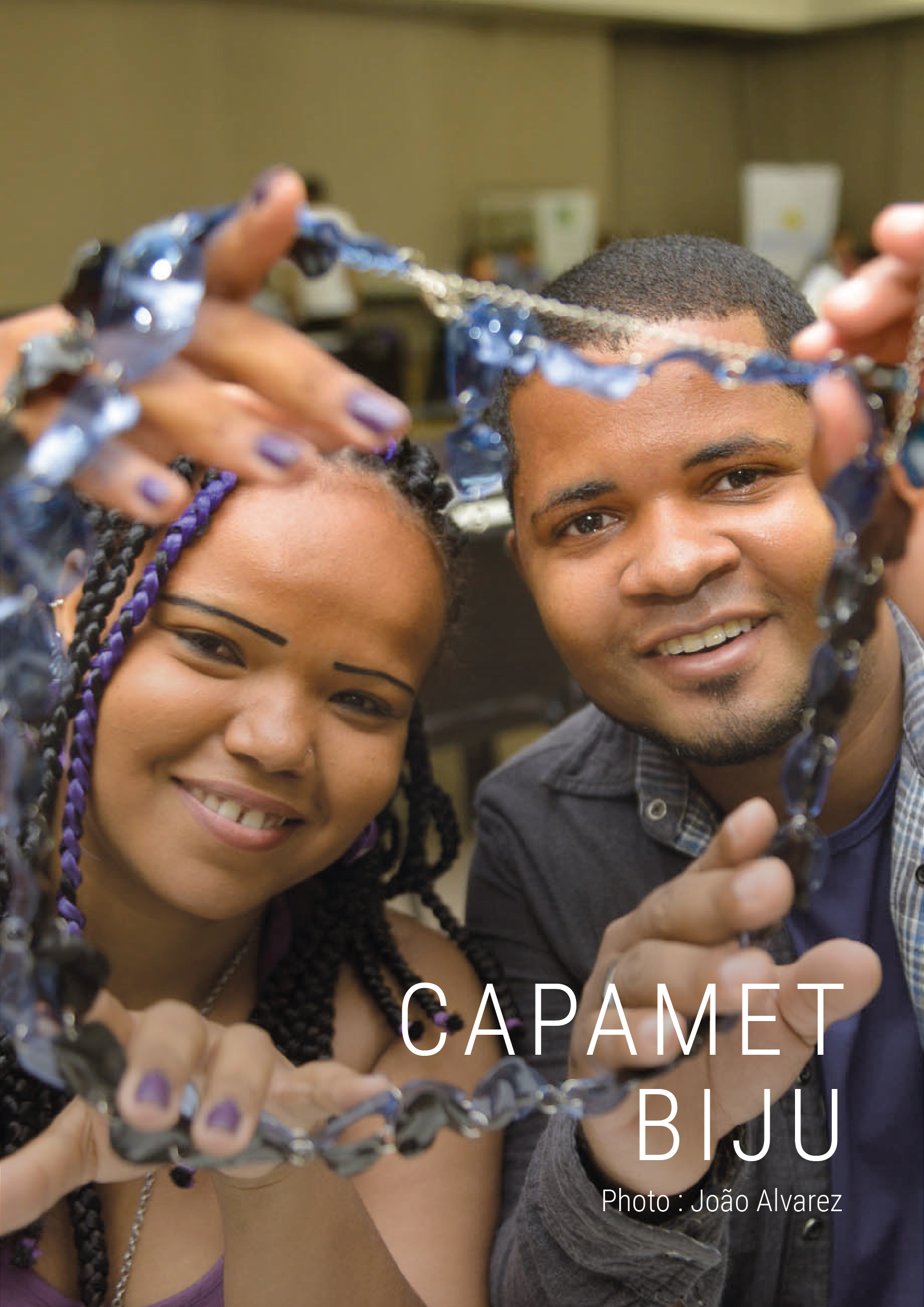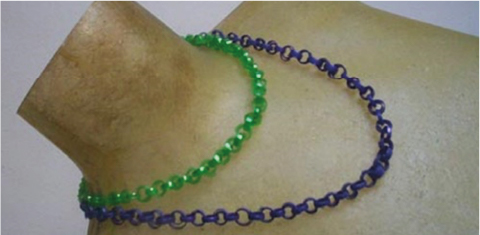
Photo: João Alvarez (photo with Joilson and Michele showing a necklace)

BRAZIL
CAPAMET BIJU PROJECT
CAPAMET BIJU is a bijou components and assembly factory that utilizes PET plastics from post-use packages as its product’s main source of material. It is a social enterprise, conceived and coordinated by Bia Simon, a professor and jewelry designer. It is a joint effort between UNEB, Bahia State University and CAPAMET, a waste picker association in the state of Bahia, receiving financial support from CNPq, Brazil’s National Council for Scientific and Technological Development.
The project aims to increase CAPAMET’s visibility and provide the young waste pickers the opportunity of an additional income, further complementing their survival strategies. For UNEB’s Design students, this project provides an opportunity to evaluate their own identity and values, contributing to their understanding of local design, flourishing new professional and projectual stances, directing their professional efforts to solve urgent questions in our country and away from the design in service of boundless consumerism, banalized in today’s media.
THE PROJECT
WHO?
Trainers: design professors, designers, recyclable waste pickers
Partner institutions, stakeholders:
UNEB (idea and execution); CAPAMET (collaborator, hosted the factory); SENAI-CIMATEC (plastic re-use consultant); PREFEITURA MUNICIPAL DE SALVADOR (finance of the course “Bijou as a Business”); ABDESIGN/ Associação Bahia Design (representative of Bahia’s designers who share this experience with professionals from the field); CENTRO DE DESIGN DA BAHIA (coordinated the project with the government’s commerce and exportation of Bahia products support institutions); PROGRAMA BAHIA DESIGN (interlocutor for the exchange of experiences between design and craftsmanship); SEBRAE-BA support for the Course “Bijou as as Business” and support for the factory’s viability as a small company); OUTLET CENTER (commercial center located near CAPAMET, hosted the APL (local production arrangement) project and contact for the possible commercialization of the factory’s products); COPAMARE/Cooperativa de Catadores Autônomos de Papel, Aparas e Materiais Reaproveitáveis (São Paulo) (interlocutor for the exchange of experiences, partner of the Faculty of Architecture and Urbanism of São Paulo University, through Professor Maria Cecília Loschiavo dos Santos and her undergraduate students).
WHERE?
Penisula Itapajipana (Alagados), Salvador-Bahia-Brazil.
WHEN?
2005 to 2015, ten years of continuous activities.
WHY?
Socio-productive inclusion, gender, diversity, knowledge integration, university-community integration, income generation, human needs directed design.
To promote and generate employment and income to the waste pickers and their families through sustainable and socially responsible design, through the lenses of solidary economy, cooperation and solidarity, setting an example for alternative social development.
WHAT?
Jewelry production reutilizing PET plastic bottles.
HOW?
Producing jewelry re-using PET plastic bottles as the exclusive material. With the traditional jewelry (made out of rare metal and gems) making process as a starting point, develop a jewelry making technology with PET.
IMPACTS
Increases the chances for the viability of CAPAMET’s operation, allowing the waste picker’s family to generate additional income, further advancing their survival strategies. It is an example of sustainable development, striving for a multiplicative effect and stimulating the implementation of new entrepreneurships of the same nature.
For additional information
https://cooperativacamapet.negocio.site/
https://www.facebook.com/camapetsalvador/
https://www.youtube.com/watch?v=Q9OY6fQtOZ4
CAPAMET BIJU
PROJECT | CAPAMET BIJU
COUNTRY | BRAZIL

